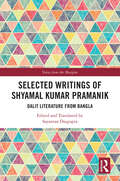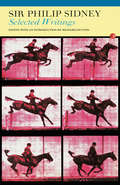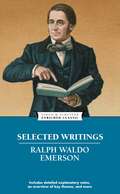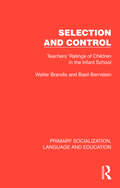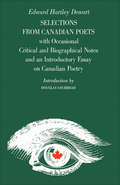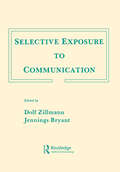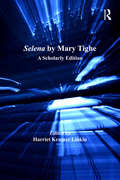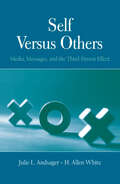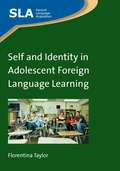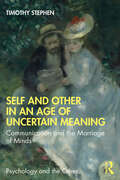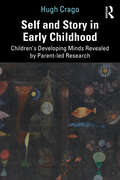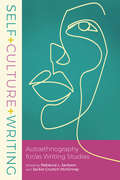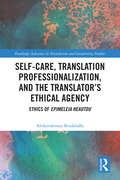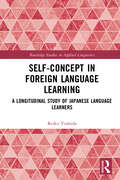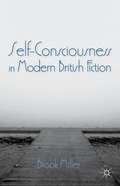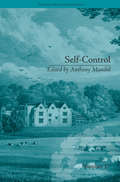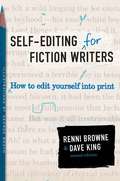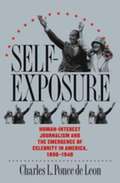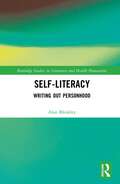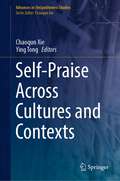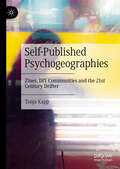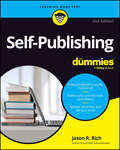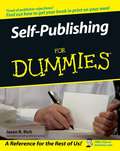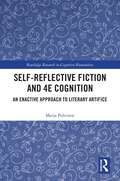- Table View
- List View
Selected Writings of Shyamal Kumar Pramanik: Dalit Literature from Bangla (Voices from the Margins)
by Sayantan DasguptaShyamal Kumar Pramanik is one of the most powerful writers of the Bangla Dalit literary movement. His evocative fictional world throws into relief the lives of the downtrodden in in contemporary India. This volume brings his fiction to a new readership by presenting English translations of a selection of his most powerful stories. This book is part of the Voices from the Margins series, which seeks to enhance the visibility of literary texts and traditions from various Indian languages and also to bring Dalit literature to the center stage. Pramanik focuses extensively on lives and lifestyles of the people in the Sundarbans, the largest mangrove forest in the world and an ecologically fragile zone. Drawn from personal experience, many of these stories paint in vivid colors the deprivations that define life in this part of the world. His fiction highlights the workings of caste.. The translations in this anthology are buttressed by an interview with the writer which includes his reflections on his life, society, and his writings, opening up new possibilities of understanding his work in its larger social context. The book also creates an academic framework within which Pramanik’s fiction can be read and critically analyzed. This critical edition will be of interest to students and researchers of comparative literature, South Asian literature and culture, modern Indian literature, Dalit studies, culture, history, and sociology.
Selected Writings: Selected Writings
by Sir Philip SidneyFirst published in 2003. Routledge is an imprint of Taylor & Francis, an informa company.
Selected Writings: Words Of Good Counsel On The Choice And Use Of Books Selected From The Writings Of Ten Famous Authors (Enriched Classics)
by Ralph Waldo EmersonAn essential collection of the most noteworthy essays and poems of Ralph Waldo Emerson, a leading architect of the Transcendentalist movement, which championed self-reliance, individualism, and personal potential. THIS ENRICHED CLASSIC EDITION INCLUDES: A concise introduction that gives the reader important background information A chronology of the author's life and work A timeline of significant events that provides the book's historical context An outline of key themes to guide the reader's own interpretations Detailed explanatory notes Critical analysis and modern perspectives on the work Discussion questions to promote lively classroom and book group interaction A list of recommended related books and films to broaden the reader's experience Simon & Schuster Enriched Classics offer readers affordable editions of great works of literature enhanced by helpful notes and insightful commentary. The scholarship provided in Enriched Classics enables readers to appreciate, understand, and enjoy the world's finest books to their full potential.
Selection and Control: Teachers' Ratings of Children in the Infant School (Primary Socialization, Language and Education)
by Basil Bernstein Walter BrandisOriginally published in 1974, Selection and Control: Teachers' Ratings of Children in the Infant School consists of an analysis of teachers’ ratings of children in a middle-class and in a working-class area at the end of their first year and the end of second year of life in the infant school. Presented in two parts, Part One is highly technical as it sets out in some detail the logic of the statistical description. Part Two gives one interpretation of the findings as these might throw light upon differences in the patterns of the teachers’ judgments in the middle-class and working-class area. The results of the maternal interview given in the Appendix show very clearly major class differences in the reported preparation of the child for the current educational experience of the infant school. Today it can be read in its historical context.
Selections from Canadian Poets: With Occasional Critical and Biographical Notes and an Introductory Essay on Canadian Poetry
by Douglas Lochhead Edward DewartSelections from Canadian Poets set an important precedent when it was published in 1864. It was the first anthology of native Canadian poetry and was compiled, as Edward Hartlet Dewart explained, in order to 'rescue from oblivion some of the floating pieces of Canadian authorship worthy of preservation in a more permanent form ...' This anthology, like any other, reflects the tastes of the anthologist and the tenor of the times. Pre-confederation poets had deeply felt ties with other countries from which developed a shared concern for what Douglas Lochhead terms in his introduction the 'now' and the 'place,' often described in terms of the 'past' and the 'other place,' which embraced a still larger loyalty – religious, political, philosophical, and above all nationalistic. Dewart was widely commended by critics of his attention for its endeavour to come to grips with the influences of other literatures (mainly English) and for its realization that so-called 'colonialism' was a major shaping force of Canadian poetry. On the first page of his essay Dewart states that: A national literature is an essential element in the formation of national character. These words, as well as his perceptive appraisal of the problems of Canadian literary endeavours, still apply today and make this reprint timely and pertinent.
Selective Exposure To Communication (Routledge Communication Series)
by Dolf Zillmann and Jennings BryantFirst published in 1985. Research into what is usually referred to as mass communication has concentrated on the societal impact of the media. The ways in which these media influence people and affect their behavior have been at issue. For the most part, undesirable effects were pondered and documented. Only a few desirable effects received similar attention and scrutiny. The research preoccupation with impact has been so pronounced that, comparatively speaking, next to no attention has been paid to questions such as why people enjoy whatever they elect to watch or hear, and more fundamentally, why they elect to watch or hear, in the first place, whatever it is that they elect to watch or hear. Without a symposium on research into selective exposure to informative and entertaining messages nor a publication that brought together the recent research in this area, this volume was put together in an effort to end this dilemma and to put selective-exposure research on the map as a significant research venture.
Selena by Mary Tighe: A Scholarly Edition
by Harriet Kramer LinkinMary Tighe's unpublished novel Selena is one of the great unknown treasures of British Romanticism. Completed in 1803, this brilliant, compulsively readable, beautifully written, and psychologically astute courtship novel is finally available in a scholarly edition that reveals Mary Tighe to have been as talented a fiction writer as she was a poet. The history of this amazing work's long journey from manuscript to print is only one of the stories Harriet Kramer Linkin recounts in this scrupulously annotated edition based on the only known copy of the manuscript, currently part of the National Library of Ireland's holdings. Linkin's introduction situates the novel in its historical context, draws attention to significant aspects of the plots and characters, and makes a strong case for Selena's importance for understanding the history of the novel, fiction by women, Anglo-Irish fiction, silver-fork novels, and the Romantic period. Explanatory notes explain obscure references and contexts, identify allusions to other writers, and provide translations of any non-English or archaic words. Selena itself is a revelation in its frank treatment of the darker aspects of Tighe's world, including parents who mistreat, cheat, or fail their children and spouses who commit adultery or betray one another emotionally. At the same time, it is magnificent in its stunning and moving portrayals of romantic love, of the possibility and importance of female friendship, of the difficult necessity of choosing sense over sensibility, and of the need for women and men to choose self-enhancing vocations. This extraordinary novel is destined to open up new ways of thinking by scholars of the Romantic era and the history of the novel.
Self Versus Others: Media, Messages, and the Third-Person Effect (Routledge Communication Series)
by Julie L. Andsager H. Allen WhiteSelf Versus Others explores the third-person effect and its role in media as a means of persuasion. This scholarly work synthesizes more than two decades of research on the third-person effect, the process in which individuals do not perceive themselves to be impacted by particular messages—such as persuaded to engage in risky behaviors or encouraged to be violent—but they believe others will be. Authors Julie L. Andsager and H. Allen White focus their analysis specifically on the role of media and media messages, and assert that the third-person effect functions as a means of persuasion. They explore the underlying concepts and connections this effect shares with established theories of persuasion and mediated communication. The only volume to date focusing on the topic, Self Versus Others demonstrates the significant impact persuasion has on public opinion, behavior, and policy. As such, understanding the means through which persuasion can be accomplished thereby provides a powerful tool. Timely and succinct, this book:*provides thorough synthesis of third-person effect literature;*argues that systematic versus heuristic processing underlies third-person perceptions; and*conceptually links third-person effects with co-orientation. Intended for communication scholars with an interest in persuasion, as well as those in key areas including mass communication, health communication, and political communication, this book is also appropriate for advanced courses in persuasion, communication theory, and campaigns.
Self and Identity in Adolescent Foreign Language Learning
by Florentina TaylorThis book explores the role of identity in adolescent foreign language learning to provide evidence that an identity-focused approach can make a difference to achievement in education. It uses both in-depth exploratory interviews with language learners and a cross-sectional survey to provide a unique glimpse into the identity dynamics that learners need to manage in their interaction with contradictory relational contexts (e.g. teacher vs. classmates; parents vs. friends), and that appear to impair their perceived competence and declared achievement in language learning. Furthermore, this work presents a new model of identity which incorporates several educational psychology theories (e.g. self-discrepancy, self-presentation, impression management), developmental theories of adolescence and principles of foreign language teaching and learning. This book gives rise to potentially policy-changing insights and will be of importance to those interested in the relationship between self, identity and language teaching and learning.
Self and Other in an Age of Uncertain Meaning: Communication and the Marriage of Minds (Psychology and the Other)
by Timothy StephenSelf and Other in an Age of Uncertain Meaning explores the nature and origins of widespread problems of self in modern societies. It examines the paradoxical interplay between the modern world's many benefits and freedoms, and its mounting social challenges and psycho-emotional impacts. Over time the character of consciousness has shifted in concert with societal trends. The experienced world has become more nuanced, fragmented, and uncertain, as well as increasingly personal and intimate, reshaping social relationships. Chapters analyze the interdependence of language, mind, intimacy, the self, and culture, arguing that as the coevolution of these five factors produced the modern world, many features of contemporary culture have become disruptive to security of being. The book explores the importance to the vital sense of self in constructing relationships based in mutual recognition of moral and intellectual equality between partners.Rich with examples from everyday experience, this text offers profound insights for those interested in sociology, psychoanalysis, psychology, communication, history, and culture.
Self and Soul: A Defense of Ideals
by Mark EdmundsonIn a culture of the Self that has become progressively more skeptical and materialistic, we spare little thought for the great ideals--courage, contemplation, and compassion--that once gave life meaning. Here, Mark Edmundson makes an impassioned attempt to defend the value of these ancient ideals and to resurrect Soul in the modern world.
Self and Story in Early Childhood: Children’s Developing Minds Revealed by Parent-led Research
by Hugh CragoOur children grow up into a world of stories—in books, on screens—but what do they make of the stories we offer them? What do they think and feel as they listen to a parent read a picture-book? What if a story confuses or upsets them? Over the past fifty years, several intelligent, committed mothers undertook the onerous task of recording exactly what their children said and did in response to the stories they shared. Some of their records extended over five years, or even longer. Their research, done without funding or academic supervision, offers us unparalleled insight into children’s minds long before they learn to speak—let alone learn to read. In Self and Story in Early Childhood, Hugh Crago draws on his unusual combination of expertise in literary studies, developmental psychology and psychotherapy to re-examine the startling implications of this neglected body of evidence. He highlights how much children can achieve without formal teaching, but with the supportive presence of a trusted adult who will participate with them in the story experience. This book will be of great interest to scholars of developmental psychology, early literacy and narratology, as well as to professionals working with preschoolers. Most of all, it will fascinate parents who themselves share stories with their child.
Self+Culture+Writing: Autoethnography for/as Writing Studies
by Rebecca Jackson Jackie Grutsch McKinneyLiterally translated as “self-culture-writing,” autoethnography—as both process and product—holds great promise for scholars and researchers in writings studies who endeavor to describe, understand, analyze, and critique the ways in which selves, cultures, writing, and representation intersect. Self+Culture+Writing foregrounds the possibility of autoethnography as a viable methodological approach and provides researchers and instructors with ways of understanding, crafting, and teaching autoethnography within writing studies. Interest in autoethnography is growing among writing studies scholars, who see clear connections to well-known disciplinary conversations about personal narrative, as well as to the narrative turn in general and social justice efforts in particular. Contributions by authors from diverse backgrounds and institutional settings are organized into three parts: a section of writing studies autoethnographies, a section on how to teach autoethnography, and a section on how ideas about autoethnography in writing studies are evolving. Self+Culture+Writing discusses the use of autoethnography in the writing classroom as both a research method and a legitimate way of knowing, providing examples of the genre and theoretical discussions that highlight the usefulness and limitations of these methods. Contributors: Leslie Akst, Melissa Atienza, Ross Atkinson, Alison Cardinal, Sue Doe, Will Duffy, John Gagnon, Elena Garcia, Guadalupe Garcia, Caleb Gonzalez, Lilly Halboth, Rebecca Hallman Martini, Kirsten Higgins, Shereen Inayatulla, Aliyah Jones, Autumn Laws, Soyeon Lee, Louis M. Maraj, Kira Marshall-McKelvey, Jennifer Owen, Tiffany Rainey, Marcie Sims, Amanda Sladek, Trixie Smith, Anthony Warnke
Self-Care, Translation Professionalization, and the Translator’s Ethical Agency: Ethics of Epimeleia Heautou (ISSN)
by Abderrahman BoukhaffaThis book draws on an interdisciplinary approach to investigate the impact of codes of ethics as prescribed in translator organizations, proposing alternative ethical pathways grounded in self-care ethics to enhance translators’ symbolic recognition and ethical agency.The volume seeks to provide a counterpoint to existing views in translation studies research on ethics by building on work in sociology and philosophical genealogy, particularly Foucault’s notion of Epimeleia Heautou, to establish a framework of self-care ethics. Featuring analyses of various codes of ethics across different professional associations, the book offers a critical examination of the potential impact of codified ethics on translator autonomy and symbolic status and in turn, their broader social and planetary responsibilities within their roles as translators beyond the translation community. In setting out an alternative charter of ethics which promotes a culture of the self within larger institutions and critical pedagogy within translator education programs, the volume charts new directions in emergent debates on ethics in translation practice.This book will appeal to scholars in translation and interpreting studies, particularly those interested in ethics and sociological and philosophical approaches within the discipline.
Self-Concept in Foreign Language Learning: A Longitudinal Study of Japanese Language Learners (Routledge Studies in Applied Linguistics)
by Reiko YoshidaThis book explores self-concept in foreign language (FL) learning, tracing the trajectories of a group of Japanese language learners at an Australian university to illuminate new insights about the factors impacting positive self-concept and implications for language learning more broadly.The volume calls attention to the ways in which learners’ perception of themselves as FL learners plays a fundamental role in FL learning. Drawing on data from a longitudinal study, including student diaries, interviews and classroom observations, Yoshida outlines shifts in self-concept as learners progress from secondary school to university courses to study abroad and beyond. The book demonstrates how the learner journey is marked by a growing recognition of the importance of practice for achievement but also a greater sense of self-consciousness, with learners’ agency in creating opportunities for themselves to practice their FL as a key factor in improving self-concept over time. This work offers unique observations about self-concept for learners who already ‘have’ global English as a first language, inspiring ways forward for future research and language teaching in other under-studied languages. The book will appeal to students and researchers in applied linguistics, SLA and foreign language learning, as well as stakeholders in Japanese language programs.
Self-Consciousness in Modern British Fiction
by Brook MillerThis book uncovers representations of self-consciousness in selected modern British novels. In these works, self-consciousness complicates character development. Miller records the experience of dualism in worksby authors such asConrad, Joyce, and D. H. Lawrence in order todemonstratethe emergence of a self who feels split from the world. This work explores the development of British modernismalongsidecognitive approaches to literature. "
Self-Control: by Mary Brunton (Chawton House Library: Women's Novels #17)
by Anthony MandalSelf-Control (1811) was a literary sensation, going into four editions in its first year. The first novelist to set her story against a strong Scottish background, Brunton set the scene for other writers such as Walter Scott. Jane Austen was also a fan, she read it at least twice, worrying that the work might foreshadow her own creations.
Self-Editing for Fiction Writers, Second Edition
by Dave King Renni BrowneHundreds of books have been written on the art of writing. Here at last is a book by two professional editors to teach writers the techniques of the editing trade that turn promising manuscripts into published novels and short stories. In this completely revised and updated second edition, Renni Browne and Dave King teach you, the writer, how to apply the editing techniques they have developed to your own work. Chapters on dialogue, exposition, point of view, interior monologue, and other techniques take you through the same processes an expert editor would go through to perfect your manuscript. Each point is illustrated with examples, many drawn from the hundreds of books Browne and King have edited.
Self-Exposure
by Charles L. Ponce de LeonFew features of contemporary American culture are as widely lamented as the public's obsession with celebrity--and the trivializing effect this obsession has on what appears as news. Nevertheless, America's "culture of celebrity" remains misunderstood, particularly when critics discuss its historical roots. In this pathbreaking book, Charles Ponce de Leon provides a new interpretation of the emergence of celebrity. Focusing on the development of human-interest journalism about prominent public figures, he illuminates the ways in which new forms of press coverage gradually undermined the belief that famous people were "great," instead encouraging the public to regard them as complex, interesting, even flawed individuals and offering readers seemingly intimate glimpses of the "real" selves that were presumed to lie behind the calculated, self-promotional fronts that celebrities displayed in public. But human-interest journalism about celebrities did more than simply offer celebrities a new means of gaining publicity or provide readers with the "inside dope," says Ponce de Leon. In chapters devoted to celebrities from the realms of business, politics, entertainment, and sports, he shows how authors of celebrity journalism used their writings to weigh in on subjects as wide-ranging as social class, race relations, gender roles, democracy, political reform, self-expression, material success, competition, and the work ethic, offering the public a new lens through which to view these issues.
Self-Literacy: Writing Out Personhood (Routledge Studies in Literature and Health Humanities)
by Alan BleakleySelf-Literacy: Writing Out Personhood offers fifty perspectives on gaining an understanding of what ‘personhood’ may mean through various disciplines. Literature is a key medium through which selves are mapped as humans are written into being. Such literature is intimately tied to health such as within self-help literature, written accounts of illness, or of characters who are defined by their afflictions – physical, psychological, and moral. This book adopts an essay approach to aspects of selfhood, including disciplines of psychology (personality), sociology (social selves), anthropology (cultural selfhood), literary (the self as portrayed in literature), and history (notions of self through time). Each chapter can be read in isolation, and a comprehensive list of works on self is provided as a bibliography. This book will appeal to researchers and postgraduates engaged in the fields of Literature and Health Humanities, as well as psychology, sociology, and anthropology academics and students.
Self-Praise Across Cultures and Contexts (Advances in (Im)politeness Studies)
by Chaoqun Xie Ying TongThis book explores the extent to which self-praise is acceptable in both offline and online contexts, across different genres, platforms, and cultural backgrounds. The data analyzed encompass both naturally occurring (daily conversation as well as institutional talk) and elicited (experiments and interviews) types, and are explored at both quantitative and qualitative levels to offer a relatively systematic and comprehensive inquiry into self-praise as social (inter)action. Contributors to this book not only draw on traditional politeness theories but are also informed by social psychology, interactional sociolinguistics, CMC, and (multimodal) discourse analysis. They are inspired by pragmatics but also go beyond to ground their studies within locally situated cultural contexts, most of which are under-presented in the current academic world. Their efforts substantiate the fact that self-praise is most worthy of intensive analytic attention. This book appeals to students and researchers in the field and contributes to the way communication is facilitated through different ways of deploying linguistic and interactional resources.
Self-Published Psychogeographies: Zines, DIY Communities and the 21st Century Drifter
by Tanja KappThis book explores the world of psychogeographical walking as portrayed in zines – self-made, low-budget publications circulated within DIY communities. Termed "new psychogeography", the representation of these mobilities in zines challenge conventional dualisms, favoring peripheral spaces and polyphonic perspectives over urban-centric voyeurism. Through four case studies, the book explores the evolution of the contemporary drifter, emphasizing a departure from conquering cityspaces through stalking to exploring how spaces shape memory, experience, and notions of home. Pioneering research at the intersection of zine and travel writing studies, it unveils the psychogeographical mediality inherent to this medium.
Self-Publishing For Dummies
by Jason R. RichGet your books into the hands of readers with this simple how-to guide Self-Publishing For Dummies takes you through the entire process of publishing your own books, starting with the writing and editing process and moving through cover design, printing options, distribution channels, and marketing to a target audience. With the advice in this book, you can tackle self-publishing, no matter what genre you write in. You’ll learn how to retain full control over your work and keep the profits from the sales of your book. In this updated edition, you’ll discover the latest technologies in self-publishing, trends in the world of ebooks, and new marketing techniques you can use online and in the real world. Becoming a published author is easier than ever, thanks to this Dummies guide. Understand every step in the self-publishing process Discover how to write and sell your books in ebook and printed formats Hire an editor, obtain an ISBN, and generate publicity for your book Fine-tune your writing to improve your chances of success Get your work out there—no agent or publisher neededSelf-Publishing For Dummies is the perfect choice for anyone with an interest in DIY publishing.
Self-Publishing For Dummies (For Dummies Ser.)
by Jason R. RichCovers budgeting, copyrighting, and marketing Know the pros and cons of self-publishing and get your work in print Thinking about self-publishing your book? This no-nonsense guide walks you through the entire process of going it alone, from preparing your manuscript and creating the perfect title to selling the final product. You'll see how to obtain an ISBN, work with printers and distributors, create a buzz with publicity, and take advantage of electronic publishing. Discover how to * Start your own publishing company * Edit your work effectively * Design and format your book * Hire skilled professionals to help * Manage outside vendors * Build awareness for your book online
Self-Reflective Fiction and 4E Cognition: An Enactive Approach to Literary Artifice (Routledge Research in Cognitive Humanities)
by Merja PolvinenThis book brings together the study of self-reflective fiction and the contemporary 4E theories of cognition in order to challenge existing cognitive-theoretical models and approaches to literary phenomena. Polvinen presents reflective attention on artifice as an integral part of engagement with fictional narratives, rather than as an external viewpoint that would obscure immersive experiences. The detailed analyses included are both of traditionally metafictional texts by John Barth, A.S. Byatt, Dave Eggers, and Ali Smith, as well as of speculative fictions by Ted Chiang, China Miéville, Christopher Priest, and Catherynne M. Valente. Each of the chapters focuses on a specific issue of fictional cognition: on metaphorical representation, spatiality, temporality, and fictionality. As a whole, the book argues that by combining a literary and theoretically complex view of artifice with the enactive paradigm of perception and imagination, practitioners of cognitive literary studies can further sharpen their own conceptual and terminological apparatus and continue to generate fruitful hermeneutic circulation around the study of the imagination in both the sciences and the humanities. This book will appeal to students and scholars interested in cognitive approaches to literary studies, speculative fiction, metafiction, and narrative studies.
